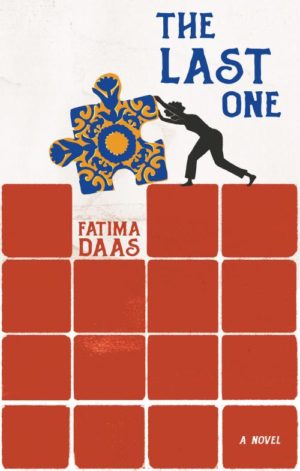You have no items in your cart. Want to get some nice things?
Go shopping
She is Muslim, she is a sinner, a liar and a lesbian and in some ways she is all of us. In The Last One by Fatima Daas, the narrator declares to her mother that not every girl wants to be a princess, but girls all around the globe have been taught that this is a desire that they share and more importantly that it will be their salvation. Whilst most of us accept early on that this is false, others, like Daas, have the courage to actually say so.
The Last One draws you in, little by little, and before you know it you find yourself sitting by the narrator’s side on the train as she makes the hour’s long commute across Paris. Her descriptions of fellow commuters ring true, as does her reaction to them. Her observations are ones we have all experienced, and you can feel her frustration as she acknowledges her own imperfections and the struggle to overcome them. You learn how important being a Muslim is to her and that she finds great comfort in her faith, even though she has not fully understood just what place she occupies within it. For the doubt creeps in as it does with many of us; does God love me unconditionally or will he abandon me and leave me alone? Practicing her faith comes from an intense desire and love – not from obligation. Every day she convinces herself that she is living a double life as the acknowledgement of her sins plagues her thoughts. Yet she doesn’t give up, she continues to strive to be good and worthy of love.
These internal dialogues may sound familiar, the narrator weaving in and out of past and present so seamlessly, that the reader recalls the times that he or she has felt much the same way and a certain melancholy sets in. The more you read the more you become a part of it, but are you becoming a part of her life, or a part of a story that Daas has created for you take part in? The author brilliantly blurs the line between the two. The core of the story is in essence the core of everyone’s story: how do we find our place in the world and within our family? We ask ourselves: where do I fit in, if I fit in at all? Daas fears her father’s violent outbursts and begins to view him as a monster. She feels strains as their relationship withers away into nonexistence. She deeply admires her mother yet knows she can never be like her or live up to what her family expects of her. These already complicated relationships are compounded by an intense identity struggle that accompanies the narrator as she navigates a transition between adolescence and adulthood that leaves her feeling maladjusted. Yet what is encouraging is the solace she finds on the stage and in words. Scribbling away on the metro she confides, “I write stories so I don’t have to live my own,” exposing not only the heart-wrenching solitude of an existence that is too painful to confront, but also the vulnerability of not knowing if that existence will be met with love or hate. She writes about a character she seems in awe of named Lola. “Lola is a tomboy too, but not like me. Physically, she looks like a girl. She found the balance.” She is in awe because someone has found the illusive balance that she so intensely desires herself.
In this age of social media where attacks and criticism of all that’s different abound, a constant struggle for recognition and acceptance is apparent. Through her written words, Fatima Daas finds the liberation we all seek. In taking to her pen to publicly excavate the complex world of the self she stands tall, claiming her own inimitability so that others may find the courage to do the same.
As most of us view the world through our own lens of reality, not everyone will fully appreciate The Last One, not because of the writing, (the writing is inspired), but because for some certain religious and sexual elements may feel quite removed from their own experience. But isn’t this why we open books in the first place? For what Daas is offering us here is a unique chance to visit that other place, that place where the boundaries defining sexuality and race are fluid and porous, where ideas about the self are things that constantly change, revealing identities that are multi-faceted and incongruous. For whether or not people can see pieces of their own lives in Daas’s novel they will certainly understand its importance.
The Last One is not the genre I am typically drawn to, but I’m so glad I read it. Because in the end what the story so beautifully reminds us of, is that no matter where we came from or what our faith is, we are far more alike than we are different. We share our internal struggles and self-doubt. Reading The Last One will take you outside of yourself. It will allow you to see the others with the understanding and compassion we all deserve. Word by word Fatima Daas takes you by the hand and invites you on a journey you didn’t realize you needed to take.
The Last One
By Fatima Daas
Translated from the French by Lara Vergnaud
Other Press, 208 pages
Samantha Gordon
Samantha recently completed her Masters in Comparative Literature but has no intention of ever completing her education, though is pursuing a Ph.D. in Food Anthropology. She is a film noir aficionado, loves gardening and anything to do with food. She lives in the desert Southwest with her husband, myriad animals and has Edgar Allan Poe as a muse; who could ask for anything more. Please feel free to contact her at samfraziergordon@yahoo.com.




